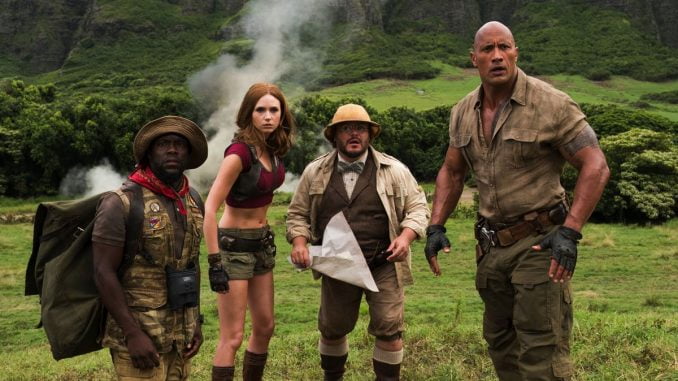
/cdn.vox-cdn.com/uploads/chorus_image/image/58088717/DF_05153_R_2040.0.jpg)
In 1995, director Joe Johnston adapted the children’s novel Jumanji, telling the story of a magical board game that could blur the lines between fantasy and reality. Twenty-two years later, it’s apparently time for the seemingly inevitable Hollywood reboot. (Technically, Jumanji: Welcome to the Jungle is a sequel, but when a movie is this intent on relaunching a franchise, the difference is negligible.) Naturally, there are a few new twists to update the story. The board game has become a video game, and the story isn’t about a fantasy world spilling out into our own. Instead, a group of kids get trapped inside a game, with all the gaming tropes, references, and nudge-and-winks that premise suggests.
It’s a fun idea — an opportunity for riffing on gamer culture and gaming addiction, with the self-aware shenanigans that made Wreck-It Ralph such a fun time (and Adam Sandler’s Pixels, not so much). With Dwayne Johnson leading the way, Welcome to the Jungle seems like it has all the right pieces in place to be a fun, forgettable, games-infused coming-of-age story. It mostly gets there, pulling off all the expected story beats without any huge hiccups along the way. But it’s also a missed opportunity — a film about games that doesn’t understand them, with lowest-common-denominator gags in place of inventive humor or sly observations.
A brief prologue sets up the connective tissue between the films: for no apparent reason other than magic, the Jumanji board game at the center of the 1995 movie transforms into a retro gaming console that looks like a mix between an Atari 2600 and the ColecoVision. In the present day, a Breakfast Club-esque collection of teenagers are roped into detention together: there’s Spencer (Alex Wolff), a standard gawky nerd; Fridge (Ser’Darius Blain), the football star; Bethany (Madison Iseman), who spends most of her time on her phone; and Martha (Morgan Turner), filling the Ally Sheedy role as a young woman who feels like she’s a lot more awkward than she actually is. They don’t get along, naturally, and when they discover the mystery console and decide to kill some time, they are suddenly swept into the actual jungle world of Jumanji.
Welcome to the Jungle’s first big gag is how the four misfits appear in the game. Each chooses a different gaming avatar before they’re sucked inside, which leads to some amusing fish-out-of-water hijinks right from the start. The nerdy Spencer has become the excessively charming Johnson. Football star Fridge is now an ineffectual Kevin Hart, whose main abilities are carrying a large backpack and commenting on how short he is. Martha has become a butt-kicking Lara Croft rip-off, played by Karen Gillan, and Bethany is a cartographer played by Jack Black. It’s fodder for plenty of easy jokes — director Jake Kasdan and the four credited writers never seem to tire of having Black’s Bethany marvel at her new genitalia — and while they’re mostly obvious gags, they do give Johnson many opportunities to show off his charisma, with Spencer boasting about it. The film is at its very best when it embraces this meta aspect of Johnson’s onscreen persona, and it’s actually impossible to imagine any other modern actor pulling off the role. Then, when Johnson downshifts into revealing just how authentically insecure Spencer is, he’s able to pull off some real vulnerability as well.
But this is a movie about a bunch of teenagers stuck inside a video game, and Welcome to the Jungle attempts to spin that into a series of humorous shots at gaming conventions. The problem is that the movie has an awfully conventional idea of what game conventions are. The characters discover they each have three lives, which are displayed as small bars tattooed on their forearms. Smacking their chests reveals their strengths and weaknesses, rendered in 8-bit text. One odd sequence setting up the movie’s villain (Bobby Cannavale, hamming it up as much as possible) is used as an opportunity for Spencer to explain what a cut-scene is, as if that’s some hyper-obscure piece of geek knowledge. It’s almost as if the creators of the film think gaming is permanently stuck in the mid-‘90s, which turns the references into a series of out-of-touch dad jokes.
[“Source-timesofindia”]
